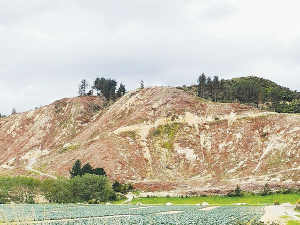ETS costs cut 66% for forest owners – McClay
Additional reductions to costs for forest owners in the Emissions Trading Scheme Registry (ETS) have been announced by the Government.
 A large, ugly scar on the landscape can be seen from highways 1 and 57 after a pine tree forest was clear felled near Levin that is now prone to slippage following heavy rain.
A large, ugly scar on the landscape can be seen from highways 1 and 57 after a pine tree forest was clear felled near Levin that is now prone to slippage following heavy rain.
OPINION: Towns and cities downstream of large forestry blocks are at high risk of infrastructure damage – costing billions – when major flooding occurs.
What happened on the east coast of the North Island this year, could happen anywhere in NZ, downstream from felled forestry blocks.
Meanwhile, logging trucks and other heavy vehicles have been causing serious damage to our roads over the past 20 years with distress on roads that were built over 50 – 100 years ago and were never designed to carry such loads.
We have seen in many parts of the country in recent years where the road has dropped away. Apart from the disruptions and inconvenience to traffic, these can cost megabucks to fix.
But who should pay for all this road reconstruction and slash damage?
Following this year’s destruction – and the Ministerial Inquiry that’s presently taking place – surely the big forestry companies must be held accountable.
Taxpayers and regional councils should not have to pay for the repairs and damage that has occurred.
Regional councils should have powers, under an amendment to the Resource Management Act, to have inspectors keeping surveillance on logging and pruning. Where slash is left and not cleaned up, those forestry entities should not be entitled to carbon credits until they clean up their act.
This legislation must override all other legislation referring to carbon credits in NZ. It could be passed by Parliament very quickly with an amendment to the RMA. I am sure it would have support on both sides of the house, going by the tide of public opinion, following the recent floods and damage this year.
A moratorium needs to be put on logging and forestry, where the soil is unstable and unable to support the weight of exotic trees in wet weather and erosion is inevitable. No more farm land should be sold to forestry companies for logging unless it is classed as unsuitable for livestock farming or returning to native bush.
Back country waterways and rivers downstream of forestry blocks must be kept free of slash and logs. This also needs to be enforced by regional councils with powers under the RMA.
Offending forestry and logging companies should be prosecuted, with penalties increased under an amendment to the RMA. If they fail to respond or work has to be undertaken to clean up the streams and rivers by local bodies, all expenses incurred should be fully recoverable from the offending parties.
We cannot just blame recent cyclones and floods for all this damage. Fifty years or more ago there were some massive floods, but our streams and rivers – without slash and logs in them – let the water get out to sea, without taking bridges and stop banks out with it.
There is no doubt global warming is happening as ocean temperatures slowly increase, but we have got the answer to climate change so wrong by planting exotic trees on steep hill country as a panacea for pollution and erosion. We need to manage these better by good legislation and action before more devastation occurs.
Levin-based Leo Cooney is now retired but had a 55 year career working in the agriculture sector – including as a farmer, a MAF livestock officer and a biosecurity and animal health technician with AsureQuality.
The Meat Industry Association of New Zealand (MIA) today announced that Chief Executive Officer Sirma Karapeeva has resigned from the role.
The winners of the 2026 Hawke’s Bay/Wairarapa Dairy Industry Awards were announced at the annual awards dinner held at Copthorne Solway Park in Masterton on Thursday evening.
Environment Southland is welcoming this week’s decision by the Environmental Protection Authority (EPA) to approve the release of Blaptea elguetai, a leaf‑feeding beetle that will help control the highly invasive Chilean flame creeper.
This March, the potato industry is proudly celebrating International Women’s Day on 8 March alongside the International Year of the Woman Farmer, recognising the vital role women play across every part of the sector — from paddocks and packhouses to research, leadership, and innovation.
Fruit trader Seeka posted a record profit and returns to shareholders in 2025.
Recent weather events in the Bay of Plenty, Gisborne/Tairawhiti, and Canterbury have been declared a medium-scale adverse event.

OPINION: A mate of yours truly reckons rural Manawatu families are the latest to suffer under what he calls the…
OPINION: If old Winston Peters thinks building trade relations with new nations, such as India, isn't a necessary investment in…